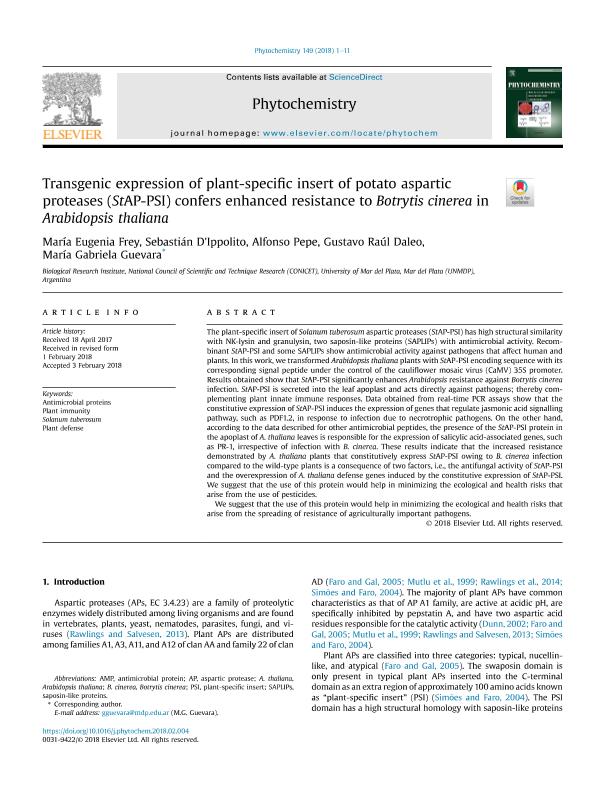Mostrar el registro sencillo del ítem
dc.contributor.author
Frey, María Eugenia

dc.contributor.author
D'ippólito, Sebastián

dc.contributor.author
Pepe, Alfonso

dc.contributor.author
Daleo, Gustavo Raul

dc.contributor.author
Guevara, Maria Gabriela

dc.date.available
2019-10-29T19:35:13Z
dc.date.issued
2018-05
dc.identifier.citation
Frey, María Eugenia; D'ippólito, Sebastián; Pepe, Alfonso; Daleo, Gustavo Raul; Guevara, Maria Gabriela; Transgenic expression of plant-specific insert of potato aspartic proteases (StAP-PSI) confers enhanced resistance to Botrytis cinerea in Arabidopsis thaliana; Pergamon-Elsevier Science Ltd; Phytochemistry; 149; 5-2018; 1-11
dc.identifier.issn
0031-9422
dc.identifier.uri
http://hdl.handle.net/11336/87588
dc.description.abstract
The plant-specific insert of Solanum tuberosum aspartic proteases (StAP-PSI) has high structural similarity with NK-lysin and granulysin, two saposin-like proteins (SAPLIPs) with antimicrobial activity. Recombinant StAP-PSI and some SAPLIPs show antimicrobial activity against pathogens that affect human and plants. In this work, we transformed Arabidopsis thaliana plants with StAP-PSI encoding sequence with its corresponding signal peptide under the control of the cauliflower mosaic virus (CaMV) 35S promoter. Results obtained show that StAP-PSI significantly enhances Arabidopsis resistance against Botrytis cinerea infection. StAP-PSI is secreted into the leaf apoplast and acts directly against pathogens; thereby complementing plant innate immune responses. Data obtained from real-time PCR assays show that the constitutive expression of StAP-PSI induces the expression of genes that regulate jasmonic acid signalling pathway, such as PDF1.2, in response to infection due to necrotrophic pathogens. On the other hand, according to the data described for other antimicrobial peptides, the presence of the StAP-PSI protein in the apoplast of A. thaliana leaves is responsible for the expression of salicylic acid-associated genes, such as PR-1, irrespective of infection with B. cinerea. These results indicate that the increased resistance demonstrated by A. thaliana plants that constitutively express StAP-PSI owing to B. cinerea infection compared to the wild-type plants is a consequence of two factors, i.e., the antifungal activity of StAP-PSI and the overexpression of A. thaliana defense genes induced by the constitutive expression of StAP-PSI. We suggest that the use of this protein would help in minimizing the ecological and health risks that arise from the use of pesticides. We suggest that the use of this protein would help in minimizing the ecological and health risks that arise from the spreading of resistance of agriculturally important pathogens.
dc.format
application/pdf
dc.language.iso
eng
dc.publisher
Pergamon-Elsevier Science Ltd

dc.rights
info:eu-repo/semantics/openAccess
dc.rights.uri
https://creativecommons.org/licenses/by-nc-sa/2.5/ar/
dc.subject
ANTIMICROBIAL PROTEINS
dc.subject
PLANT DEFENSE
dc.subject
PLANT IMMUNITY
dc.subject
SOLANUM TUBEROSUM
dc.subject.classification
Ciencias de las Plantas, Botánica

dc.subject.classification
Ciencias Biológicas

dc.subject.classification
CIENCIAS NATURALES Y EXACTAS

dc.title
Transgenic expression of plant-specific insert of potato aspartic proteases (StAP-PSI) confers enhanced resistance to Botrytis cinerea in Arabidopsis thaliana
dc.type
info:eu-repo/semantics/article
dc.type
info:ar-repo/semantics/artículo
dc.type
info:eu-repo/semantics/publishedVersion
dc.date.updated
2019-10-22T15:39:59Z
dc.journal.volume
149
dc.journal.pagination
1-11
dc.journal.pais
Estados Unidos

dc.journal.ciudad
Amsterdam
dc.description.fil
Fil: Frey, María Eugenia. Consejo Nacional de Investigaciones Científicas y Técnicas. Centro Científico Tecnológico Conicet - Mar del Plata. Instituto de Investigaciones Biológicas. Universidad Nacional de Mar del Plata. Facultad de Ciencias Exactas y Naturales. Instituto de Investigaciones Biológicas; Argentina
dc.description.fil
Fil: D'ippólito, Sebastián. Consejo Nacional de Investigaciones Científicas y Técnicas. Centro Científico Tecnológico Conicet - Mar del Plata. Instituto de Investigaciones Biológicas. Universidad Nacional de Mar del Plata. Facultad de Ciencias Exactas y Naturales. Instituto de Investigaciones Biológicas; Argentina. Universidad Nacional de Mar del Plata; Argentina
dc.description.fil
Fil: Pepe, Alfonso. Consejo Nacional de Investigaciones Científicas y Técnicas. Centro Científico Tecnológico Conicet - Mar del Plata. Instituto de Investigaciones Biológicas. Universidad Nacional de Mar del Plata. Facultad de Ciencias Exactas y Naturales. Instituto de Investigaciones Biológicas; Argentina. Universidad Nacional de Mar del Plata; Argentina
dc.description.fil
Fil: Daleo, Gustavo Raul. Consejo Nacional de Investigaciones Científicas y Técnicas. Centro Científico Tecnológico Conicet - Mar del Plata. Instituto de Investigaciones Biológicas. Universidad Nacional de Mar del Plata. Facultad de Ciencias Exactas y Naturales. Instituto de Investigaciones Biológicas; Argentina. Universidad Nacional de Mar del Plata; Argentina
dc.description.fil
Fil: Guevara, Maria Gabriela. Consejo Nacional de Investigaciones Científicas y Técnicas. Centro Científico Tecnológico Conicet - Mar del Plata. Instituto de Investigaciones Biológicas. Universidad Nacional de Mar del Plata. Facultad de Ciencias Exactas y Naturales. Instituto de Investigaciones Biológicas; Argentina. Universidad Nacional de Mar del Plata; Argentina
dc.journal.title
Phytochemistry

dc.relation.alternativeid
info:eu-repo/semantics/altIdentifier/url/http://linkinghub.elsevier.com/retrieve/pii/S0031942218300359
dc.relation.alternativeid
info:eu-repo/semantics/altIdentifier/doi/http://dx.doi.org/10.1016/j.phytochem.2018.02.004
Archivos asociados
